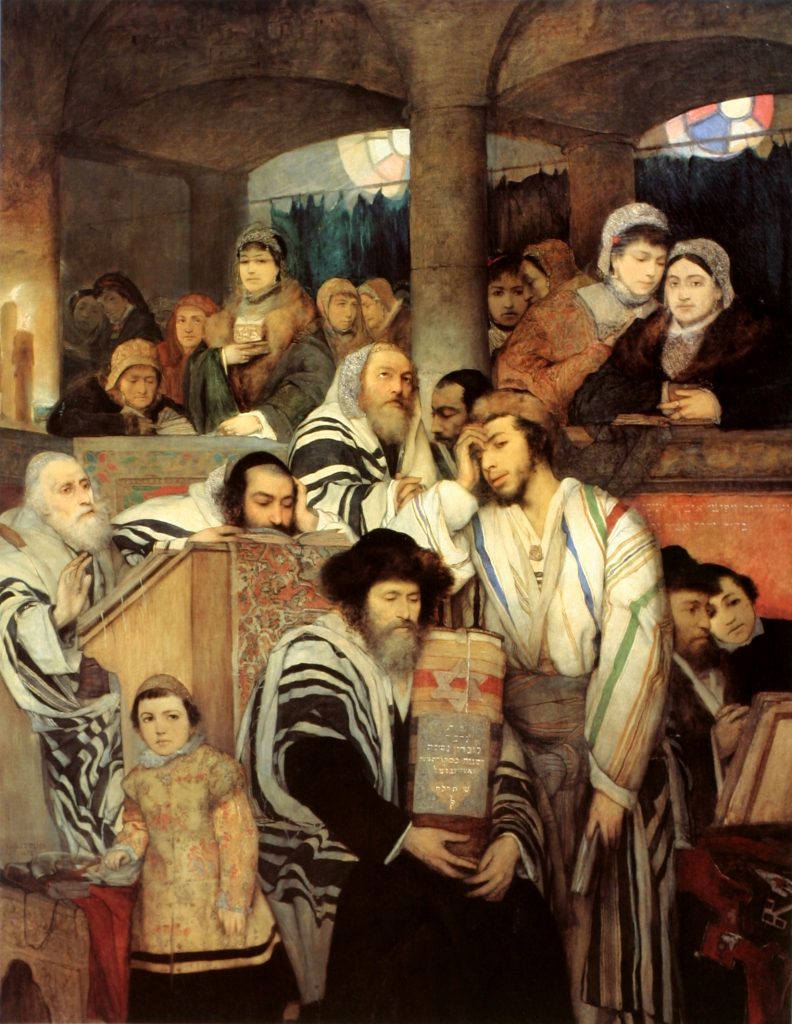Podcast: Play in new window | Download (Duration: 1:07:23 — 93.2MB) | Embed
Subscribe: Apple Podcasts | More

by Maurycy Gottlieb, 1878
Note the solemnity of the moment.
Image in the Public Domain
Yom Kippur 2019
There are many things that separate man from the beasts: intelligence, communication skills, sophisticated social order; the list goes on but the one I want to point out here is not so flattering. The animal kingdom is much better at facing reality than humans are. When an animal sees something good to eat, it eats. When an animal finds a safe place to rest, it rests. When an animal senses danger, it does something about it. It either fights or flees. This is where humans fail. Too often when we sense danger, we ignore it. You want proof? How about cigarette smoking, alcoholism and obesity. But there is a far greater danger that countless millions ignore every day:
(Heb 10:30) For we know him that hath said, Vengeance belongeth unto me, I will recompense, saith the Lord. And again, The Lord shall judge his people.
(Heb 10:31) It is a fearful thing to fall into the hands of the living God.
“Oh, but we don’t like to concentrate on that in our ministry. We’d rather talk about the love of God.” How very human of you. You see danger, you ignore it.
The cynic will accuse God of being dark and vengeful and repressive because He says things like, “The heart is deceitful above all things and desperately wicked” (Jeremiah 17:9) or “all have sinned and come short of the Glory of God” (Romans 3:23) . We wonder why God is being so mean. Why doesn’t He just ignore it like we do? Suppose you’ve been driving all night through the Mojave desert. It’s dark. You’ve been on the road for hours and you decide to pull over just to get a little sleep. A few hours later, you are rudely awakened by a sheriff’s deputy banging on your window and shouting at you. You think, “Now, can’t he see that I’m tired and need some rest?” Next thing you know you hear a freight train speeding toward you. In the darkness and due to your unfamiliarity with your surroundings you parked your car on active train tracks. In a flash, that cop goes from obnoxious blowhard to live saver.
God is pointing out your desperate, sinful condition because it is placing you in danger. The Bible makes it clear: We are helpless, hopeless sinners. As much as God loves us all…and He does love us all, He will not ignore sin. Now, this is not the place to discuss “why”. In fact, if you accept that He will not ignore sin than the “why” question doesn’t matter because once you come to the conclusion that God is holy and you’re not you will be driven to the REAL question, “What can I do about it?” Well, your mood isn’t going to improve because the answer to the question, “What can I do about my sin separating me from God” is…nothing. But, ironically…and with God there is SOOO much irony…ironically, though God is ALWAYS the offended party, He is also the only one who can make things right and the ENTIRE Bible is a record of His remedy. By the way, the only way you can make sense of the Bible, the only way the Bible will bring you joy is if you look at it as a picture of “The Atonement”. The Bible isn’t a history book, although there is history in it. The Bible isn’t a morality guide, although there is morality in it. The Bible is not a world peace plan, although there is peace in it. God’s Book is a prescription for removing sin and reuniting His people and the Seven Feasts of Israel are all of that in miniature.
Today we talk about one of the most well-known of all the Seven Feasts: Yom Kippur; in the English, The Day of Atonement. God gave this Feast to His children to demonstrate all of what we’ve said thus far: He will not tolerate sin; it must be paid for; and we will NEED a substitute…a PERFECT substitute as payment. In the Old Testament, God established an elaborate system of offerings designed to do two things: Atone for sin and to tell a story. Join us for this podcast as we find out what that story really is. Spoiler alert: It’s Jesus!
But before you begin, make sure that you are prepared in your mind, heart and spirit. Take a few moments and go to the Lord in prayer and ask Him to allow you to see wondrous things out of His Law (Psalm 119:18). Plead with God…pleading means it’s important to you…show God that what He requires is important to you so PLEAD with Him to send His Spirit to fill you with His Truth.

